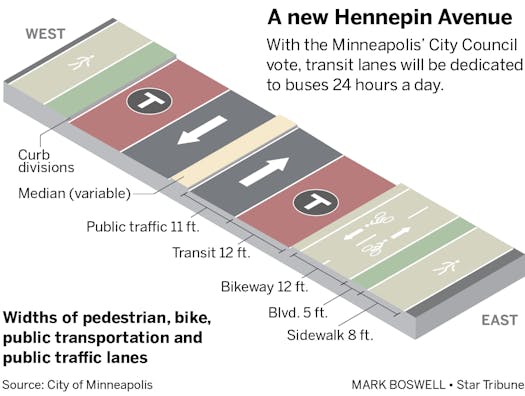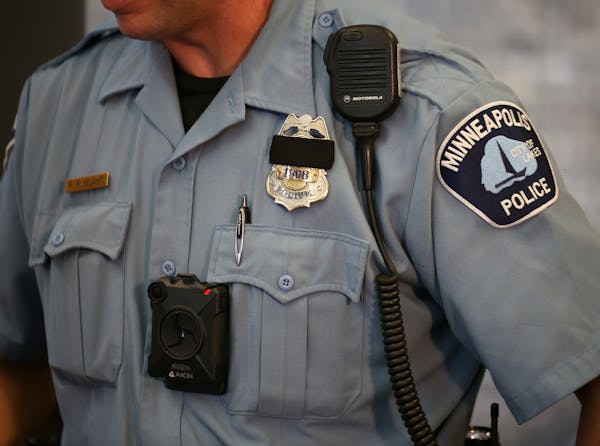Proponents pushing to have all-day bus lanes on Hennepin Avenue after the busy corridor is rebuilt won a big victory Thursday when the Minneapolis City Council approved the final layout for the project and decided to keep lanes dedicated for transit vehicles around the clock.
Bus lanes had always been included in the project, the first major reconstruction of Hennepin Avenue through the Uptown neighborhood in more than 65 years. But in May, city officials and new Public Works Director Margaret Anderson Kelliher proposed the transit lanes be used only during part of the day and be available for on-street parking during off hours.
Thursday's 8-5 council vote means bus lanes will operate 24 hours a day.
"We are thrilled," said Katie Jones, a spokeswoman for Hennepin for People, a grassroots group that pushed for the 24-hour lanes and sent more than 20,000 e-mails to city officials urging them to vote for all-day bus lanes. "This city is ready for this."
The measure now heads to Mayor Jacob Frey, who has until Wednesday to sign or veto the design that slims the bustling thoroughfare to one travel lane in each direction and also includes a protected bike lane, wider sidewalks and a center median to improve safety between Lake Street and just north of Franklin Avenue.
Construction is slated to begin in 2024 and take two years.
Metro Transit is planning a new bus rapid transit (BRT) line on Hennepin Avenue connecting the University of Minnesota with downtown Minneapolis and the Southdale Transit Center in Edina starting in 2025.
"Bus lanes along Hennepin Avenue in Uptown are critical to the success of the Metro E Line, and to our shared goals of making transit fast and attractive to users," Metro Transit's Katie Roth said.
As part of the project approval, the City Council passed a resolution Thursday allowing engineers to establish parking restrictions along the 10-block stretch in order to keep space for buses clear.
"We want to make sure that when Metro Transit is operating BRT that it is able to do that successfully," said Council Member Aisha Chughtai. "We don't want buses to have to potentially swerve into the regular lanes when cars are parked in the transit lane. That will only add to congestion."
The loss of parking has been a contentious issue over the past three years as plans for rebuilding Hennepin took shape. Business owners feared they could lose sales if on-street spaces were removed and customers were forced to park farther away.
In response, the city pointed to a study that found there are 3,600 parking spaces in surface lots and ramps and on side streets within one block of Hennepin Avenue.
The layout approved Thursday includes new loading zones adjacent to the bus lanes where people will be able to park and make deliveries. The city's public works department also plans to create a task force to address parking concerns, Chughtai said.
In the coming weeks, Chughtai said, there could be more details about what parking on Hennepin will remain. But more immediately, she said, there will be "a clear plan on how to support the business corridor during two years of construction."
Hennepin is one of the busiest city streets in Minneapolis. It carries 15,000 to 31,000 vehicles, 6,600 transit riders and 220 to 280 bicyclists daily, city figures show.
The council voted Thursday to begin negotiations with private property owners to acquire easements and additional right-of-way if necessary. It also voted to make a short section of Fremont Avenue into a two-way street and make it easier for drivers trying to turn into Kowalski's Market at 24th Street.
"We now have a plan moving forward on Hennepin Avenue South," said Council President Andrea Jenkins.

Want to share info with the Star Tribune? How to do it securely

A Minnesota field guide to snow shovels: Which one's best?
Sign up for Star Tribune newsletters



